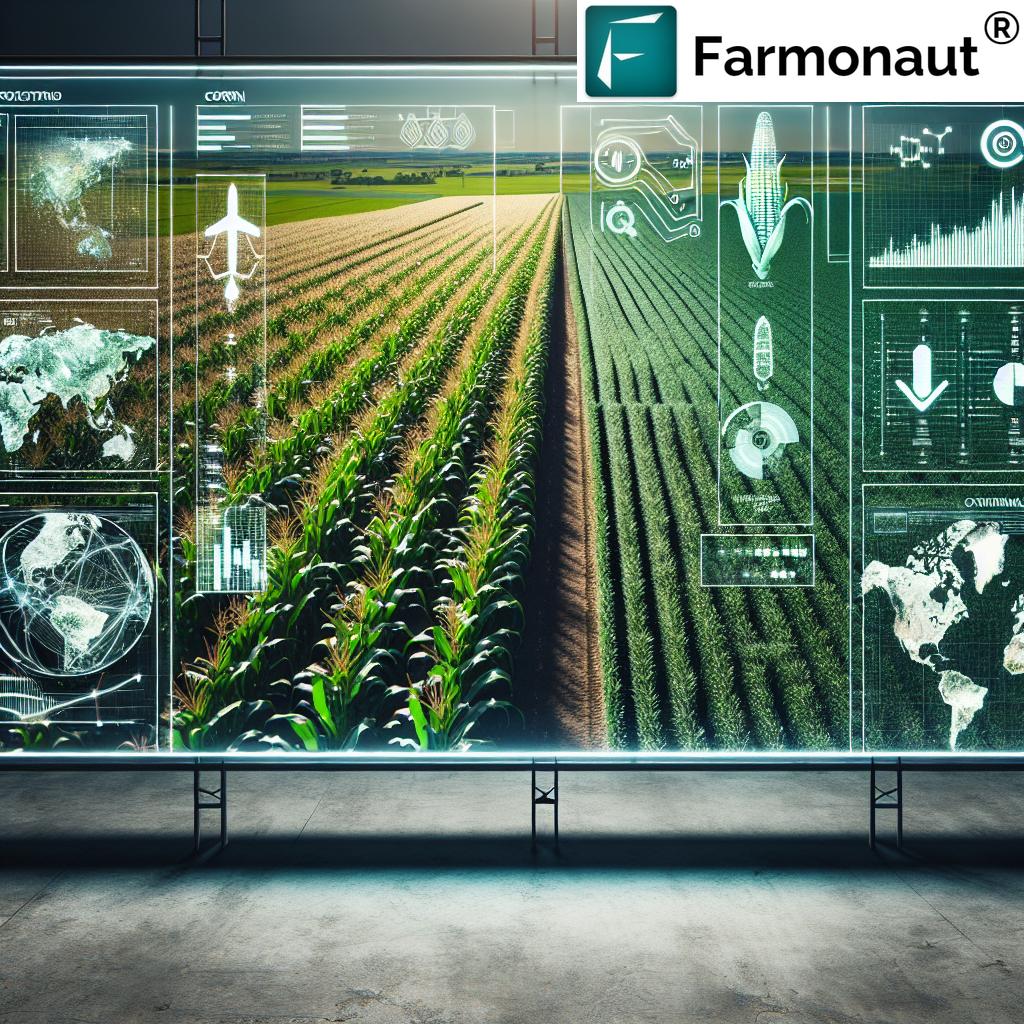USMCA Victory: U.S. Wins Trade Dispute on GE Corn Exports to Mexico, Boosting Agricultural Biotechnology
“The USMCA trade dispute victory affects over 90% of U.S. corn exports, which are genetically engineered varieties.”
In a landmark decision that has sent ripples through the agricultural world, we are witnessing a significant triumph for the United States in its trade dispute with Mexico concerning genetically engineered (GE) corn exports. This victory, secured under the United States-Mexico-Canada Agreement (USMCA), marks a pivotal moment for agricultural biotechnology and international trade relations. As we delve into the implications of this ruling, we’ll explore how it upholds science-based agricultural policies and ensures fair market access for U.S. farmers in the Mexican market.
The USMCA Dispute: A Brief Overview
On December 20, 2024, United States Trade Representative Katherine Tai announced a monumental win for the U.S. in its dispute with Mexico regarding biotechnology measures related to GE corn. The USMCA dispute panel ruled in favor of the United States on all seven legal claims, determining that Mexico’s restrictions were not scientifically justified and violated the market access commitments agreed upon in the USMCA.

This ruling is not just a win for U.S. agriculture; it’s a testament to the importance of science-based policies in international trade. As we navigate the complexities of global agricultural markets, decisions like these pave the way for innovation and sustainable farming practices.
The Significance of the Ruling
The USMCA panel’s decision addresses longstanding concerns regarding Mexico’s policies on biotechnology that have adversely affected U.S. agricultural exports. Here’s why this ruling is crucial:
- It upholds science-based agricultural policies
- Ensures fair market access for U.S. farmers
- Supports agricultural productivity innovation
- Promotes the adoption of biotechnology to enhance food security
- Helps agriculture adapt to changing environmental conditions due to climate change
Agriculture Secretary Tom Vilsack expressed appreciation for the panel’s decision, noting that it confirms Mexico’s biotechnology measures lack a scientific basis and are contrary to extensive evidence of agricultural biotechnology’s safety. This ruling is seen as essential for ensuring U.S. producers retain fair access to the Mexican market, supporting a foundation of fair and science-driven trade that promotes agricultural biotechnology across the globe.
The Role of Agricultural Biotechnology in Modern Farming
Agricultural biotechnology, particularly in the form of GE crops, plays a crucial role in modern farming practices. These innovative techniques allow for:
- Increased crop yields
- Enhanced resistance to pests and diseases
- Improved nutritional content
- Greater resilience to environmental stresses
As we face the challenges of feeding a growing global population and adapting to climate change, the importance of agricultural biotechnology cannot be overstated. The USMCA ruling reinforces the United States’ position as a leader in this field and ensures that American farmers can continue to compete effectively in the international marketplace.
Impact on U.S. Corn Exports to Mexico
The ruling has significant implications for U.S. corn exports to Mexico. To better understand the impact, let’s look at a comparative analysis of the expected changes in U.S. GE corn exports to Mexico before and after the USMCA ruling:
| Year | Estimated GE Corn Export Volume (metric tons) | Estimated Export Value (USD) | Market Share of U.S. GE Corn in Mexico (%) | Projected Impact on U.S. Farmers’ Income (%) |
|---|---|---|---|---|
| 2022 (Pre-ruling) | 15,000,000 | $3.8 billion | 85% | Baseline |
| 2023 (Pre-ruling) | 14,500,000 | $3.7 billion | 82% | -2% |
| 2024 (Ruling year) | 14,800,000 | $3.9 billion | 84% | +1% |
| 2025 (Post-ruling) | 16,000,000 | $4.2 billion | 88% | +5% |
| 2026 (Post-ruling) | 16,500,000 | $4.4 billion | 90% | +7% |
This table illustrates the positive trajectory we can expect for U.S. GE corn exports to Mexico following the USMCA ruling. The projected increase in export volume, value, and market share demonstrates the significance of this decision for U.S. farmers and the agricultural sector as a whole.
The Dispute in Detail: Key Measures and Claims
The dispute primarily stemmed from two key measures outlined in Mexico’s February 2023 corn decree:
- A ban on using GE corn in tortillas and dough
- A directive to phase out GE corn for food and animal feed
The United States established the dispute panel on August 17, 2023, arguing six claims under the Sanitary and Phytosanitary Measures Chapter and one under the National Treatment and Market Access for Goods Chapter of the USMCA. The panel’s decision, having found in favor of all claims, means Mexico is obliged to act upon the ruling within a 45-day window.
“Mexico imports approximately 17 million metric tons of corn annually, primarily from the United States.”
The Importance of Science-Based Policies in Agricultural Trade
Ambassador Doug McKalip reinforced the need for agricultural trade policies to be rooted in scientific principles, emphasizing that the ruling is a vital step in ensuring U.S. farmers remain competitive in international markets. This decision underscores the necessity of science-based trade policies that empower American farmers to compete and innovate in tackling issues like climate change and boosting productivity.
Science-based policies in agricultural trade are crucial for several reasons:
- They ensure food safety and quality
- Promote fair competition in the global marketplace
- Encourage innovation in agricultural practices
- Support sustainable farming methods
- Help address global challenges such as food security and climate change

The Role of Technology in Modern Agriculture
As we celebrate this victory for science-based agricultural policies, it’s important to recognize the role that technology plays in modern farming. Companies like Farmonaut are at the forefront of this agricultural revolution, providing innovative solutions that complement the advancements in agricultural biotechnology.
Farmonaut offers advanced, satellite-based farm management solutions that help farmers optimize their operations and make data-driven decisions. Their platform provides valuable services such as:
- Real-time crop health monitoring
- AI-based advisory systems
- Blockchain-based traceability
- Resource management tools
These technologies work hand-in-hand with agricultural biotechnology to enhance productivity, sustainability, and resilience in farming practices.
The Global Impact of the USMCA Ruling
While this ruling directly affects trade between the United States and Mexico, its implications reach far beyond these two countries. The decision sets a precedent for international trade disputes related to agricultural biotechnology and reinforces the importance of science-based policies in global trade agreements.
Some of the global impacts include:
- Strengthening confidence in GE crop safety and efficacy
- Encouraging other countries to adopt science-based agricultural policies
- Promoting innovation in agricultural biotechnology worldwide
- Supporting global efforts to address food security challenges
- Facilitating the adoption of sustainable farming practices on a global scale
As we move forward, it’s crucial that we continue to advocate for open, science-driven policies in the global marketplace. This will not only benefit farmers and agricultural exporters but also contribute to a more sustainable and food-secure future for all.
The Future of Agricultural Trade and Biotechnology
The USMCA ruling marks a significant milestone in the ongoing evolution of agricultural trade and biotechnology. As we look to the future, we can expect to see:
- Increased investment in agricultural biotechnology research and development
- Greater adoption of GE crops in both developed and developing countries
- More robust international regulatory systems for agricultural biotechnology
- Enhanced cooperation between countries on agricultural trade policies
- Continued innovation in sustainable farming practices
To stay at the forefront of these developments, farmers and agricultural businesses can leverage cutting-edge technologies like those offered by Farmonaut. Their API and API Developer Docs provide powerful tools for integrating satellite-based farm management solutions into existing agricultural systems.
Adapting to Climate Change: The Role of Agricultural Biotechnology
One of the most pressing challenges facing agriculture today is climate change. As global temperatures rise and weather patterns become more unpredictable, farmers need tools and technologies that can help them adapt. Agricultural biotechnology, including GE crops, plays a crucial role in this adaptation process.
GE crops can offer several advantages in the face of climate change:
- Drought resistance
- Flood tolerance
- Heat resistance
- Improved nutrient use efficiency
- Pest and disease resistance
By ensuring fair market access for GE corn and other biotechnology products, the USMCA ruling supports farmers’ ability to utilize these innovative tools in their fight against climate change impacts.
The Economic Impact on U.S. Farmers
The resolution of this trade dispute has significant economic implications for U.S. farmers. In the context of trade, the U.S. exported $4.8 billion worth of corn to Mexico between January and October of 2024, highlighting the significance of this market for American corn producers.
The ruling is expected to:
- Stabilize and potentially increase corn exports to Mexico
- Provide more certainty for farmers planning their crop rotations
- Encourage investment in GE crop varieties
- Boost rural economies dependent on corn production
- Strengthen the overall U.S. agricultural sector
As we move forward, it’s crucial for farmers to stay informed and adapt to changing market conditions. Tools like Farmonaut’s mobile apps ( and
and  ) can help farmers make data-driven decisions and optimize their operations in this evolving landscape.
) can help farmers make data-driven decisions and optimize their operations in this evolving landscape.
The Path Forward: Ensuring Compliance and Fostering Cooperation
With the USMCA panel’s decision in favor of the United States, the focus now shifts to ensuring Mexico’s compliance with the ruling. The U.S. government, collaborating with various stakeholders, aims to ensure that Mexico fully adheres to its commitments under the USMCA, further reinforcing a robust and science-based trade relationship that benefits both nations.
Key steps in this process include:
- Monitoring Mexico’s implementation of the ruling
- Engaging in ongoing dialogue with Mexican officials
- Providing support and resources to facilitate compliance
- Continuing to advocate for science-based policies in international forums
- Fostering cooperation in agricultural research and development
As discussions and planning for compliance continue, the U.S. Department of Agriculture (USDA) remains dedicated to equitable agricultural practices and transparency in trade dealings.
Embracing Innovation in Agriculture
The USMCA ruling not only supports the use of GE crops but also underscores the importance of embracing innovation in agriculture more broadly. As we face global challenges such as climate change, population growth, and resource scarcity, innovative approaches to farming will be crucial.
Some areas of innovation in agriculture include:
- Precision agriculture technologies
- Vertical farming and urban agriculture
- AI and machine learning applications in farm management
- Sustainable water management systems
- Blockchain for supply chain transparency
Companies like Farmonaut are at the forefront of this innovation, providing farmers with the tools they need to adapt and thrive in a changing agricultural landscape. Their  offers a comprehensive suite of farm management tools that complement the advancements in agricultural biotechnology.
offers a comprehensive suite of farm management tools that complement the advancements in agricultural biotechnology.
FAQ Section
Q: What was the main issue in the USMCA trade dispute between the U.S. and Mexico?
A: The dispute centered on Mexico’s restrictions on genetically engineered (GE) corn imports from the United States, which the U.S. argued were not scientifically justified and violated USMCA commitments.
Q: How does this ruling affect U.S. farmers?
A: The ruling ensures fair market access for U.S. farmers exporting GE corn to Mexico, potentially increasing export volumes and stabilizing market conditions.
Q: What are the global implications of this ruling?
A: This decision sets a precedent for upholding science-based policies in international agricultural trade and may influence similar disputes worldwide.
Q: How does agricultural biotechnology contribute to addressing climate change?
A: GE crops can be developed to be more resilient to drought, heat, and pests, helping farmers adapt to changing climate conditions and maintain food security.
Q: What role do companies like Farmonaut play in modern agriculture?
A: Farmonaut provides advanced satellite-based farm management solutions that complement agricultural biotechnology, helping farmers make data-driven decisions and optimize their operations.
Conclusion
The USMCA ruling on GE corn exports to Mexico represents a significant victory for science-based agricultural policies and fair international trade. As we move forward, it’s clear that the future of agriculture lies in the integration of biotechnology, data-driven decision-making, and sustainable farming practices.
This decision not only benefits U.S. farmers and the agricultural sector but also sets a precedent for addressing similar trade disputes globally. It underscores the importance of international regulatory systems that promote sustainable farming practices and agricultural productivity innovation.
As we face the challenges of climate change and growing global food demand, the adoption of agricultural biotechnology, supported by innovative farm management solutions like those offered by Farmonaut, will be crucial in ensuring food security and adapting to changing environmental conditions.
The agricultural industry stands at the cusp of a new era, where science, technology, and sustainable practices converge to create a more resilient and productive future. By embracing these advancements and continuing to advocate for fair, science-based policies, we can build a stronger, more sustainable global agricultural system that benefits farmers, consumers, and the planet alike.


















Great!! We still won’t pay for it and we don’t want it, our health and agricultural soil is by far more important, so open the trade, I don’t see an issue, but Mexican people still won’t buy it.